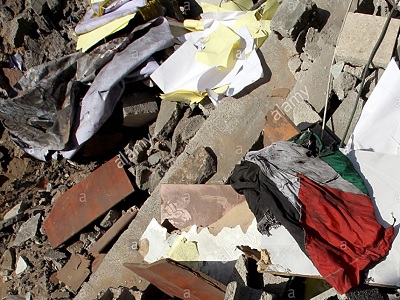
By Ola Atallah – Gaza
Just like football fans all over the world, the sports people of Gaza dream of traveling to France to attend the 2016 UEFA European Championship, which kicked off on Friday.
Yet, the sports people in the Israeli-besieged Gaza Strip are deprived of participating in this international sports event for the last ten years, including those sports events that take place only “a few hours away”, says Mohammed Alamasi, the Assistant General for the Palestinian Football Union.
Alamasi told Anadolu: “In every sports event, players and sports people in Gaza feel the sorrow, due to their inability to participate, as their counterparts do in every corner of the world.”
France is expected to see the visit of some 2.5 million-football fans, according to French authorities.
Alamasi asserts that sport in Gaza is humiliated and haunted by Israel.
He added, “The Israeli authorities prevent issuing permits for players and sports people to participate in international sports events, including sports events which take place in the West Bank.”
Palestinians moving from the Gaza Strip to the West bank require prior Israeli permits which Israeli authorities only give to certain groups such as patients, merchants and foreigners.
Israel refuses to issue many permits for Palestinians for apparent ‘security reasons.’
On March 31, 2016, the Israeli authorities prevented the exit of 103 marathon runners from Gaza, who were supposed to participate in the International Palestine Marathon, which was organized by the Palestinian Union for Athletes games in the West Bank city of Bethlehem, an event which takes place annually and sees the participation of thousands of marathon runners.
This is not the first Israeli move to hinder Palestinian sports in Gaza and will not be the last, according to Alamasi.
He added, “Sports people in Gaza don’t feel that they are players and need to move from one club to another, to be professional, and to practice sports. We need to unify the Palestinian National Tournament and Championships that the Israeli occupation has divided into two.”
On August 6, 2015, a football match took place between Ahli Alkhalil and Alshujayeh, the first to be held between two teams from the Gaza Strip and the West Bank for the last 15 years.
Following the 1967 war, in which Israel occupied the West Bank and the Gaza Strip, two sports clubs unions were formed, one in the Gaza Strip and the other in the West Bank, and the Palestinian national tournament has been taking place separately since then.
There are five major playgrounds in Gaza that were destroyed or largely damaged during the repeated Israeli wars on Gaza (three wars in six years).
Sports officials say that these playground need to be upgraded and rehabilitated to meet the requirements and standards of international football playgrounds.
During the most recent Israeli war on Gaza in 2014, Israel destroyed 40 sports facilities – playgrounds, clubs and halls – completely.
Palestinian clubs and sports institutions say 32 sports people were among those killed during the 2014 Israeli war on Gaza.
According to data published by the Palestinian Sports Ministry, three million dollars were lost to Israel’s attacks on sports facilities during the same war.
Among the buildings which were targeted in 2014, was the Palestinian Olympic Committee, Football Union, Alyarmouk Playground, Rafah Playground, Alshujayea Union Club, Alshams Club, Deir Albalah Sevices Club, Jabaliya Youth Club, Rafah Youth Club, the Sports City, and Al-Hilal Club.
On November 19, 2012, Israel destroyed the Palestine Playground (during the second war on Gaza) which will be re-opened next month after being re-built with Qatari funds.
A football player who spoke under the condition of anonymity told Anadolu, “The Israeli authorities prevent issuing many permits for players”.
He added that, “Many of us are held for long hours by the Israeli authorities; there is no special treatment for sports people, and this affects us, players, regardless of the sport we practice, as we need to travel and interact with other sports people and to participate in international forums.”
Israel arrested three players while travelling to the West Bank via the Israeli-controlled Eretz Crossing, who were released later.
Among the players who were arrested was Mahmoud Alsarsak in 2009, a player at Rafah Club, who was held without a charge or trial and went on a hunger strike for 90 days until he was finally released.
The repeated closure of the Rafah Crossing by Egypt causes the loss of many “golden” opportunities, according to Palestinian sports journalist, Nilly Almasri.
Almasri, who covers sports events in Gaza, dreams of covering international sports events, adding, “I have the membership of the International Sports Journalists Association, and I dream of covering a big sport events, but unfortunately this does not come true due to the siege.”
Almasri missed many events she was invited to attend and cover due to the closure of the Rafah Crossing with Egypt.
The Rafah Crossing connects the Gaza Strip with Egypt, and Egyptian authorities have closing this border since July 2013 for “security” reasons. It usually opens sporadically and for a few days only, to allow the crossing of humanitarian cases.
Almasri added, “Many players didn’t participate in the Arab and International championships due to the siege, which deprives sports people in Gaza of many privileges and experiences, and hinders the progress of individual and group games”.
– This article was first published in Anadoulu in Arabic and is translated by Yousef M. Aljamal. Palestine Chronicle Correspondent in the Gaza Strip.





Support Women’s Boat to break the GAZA siege!
@ShiptoGazaSE @GazaFFlotilla
DONATE https://shiptogaza.se/en/donate